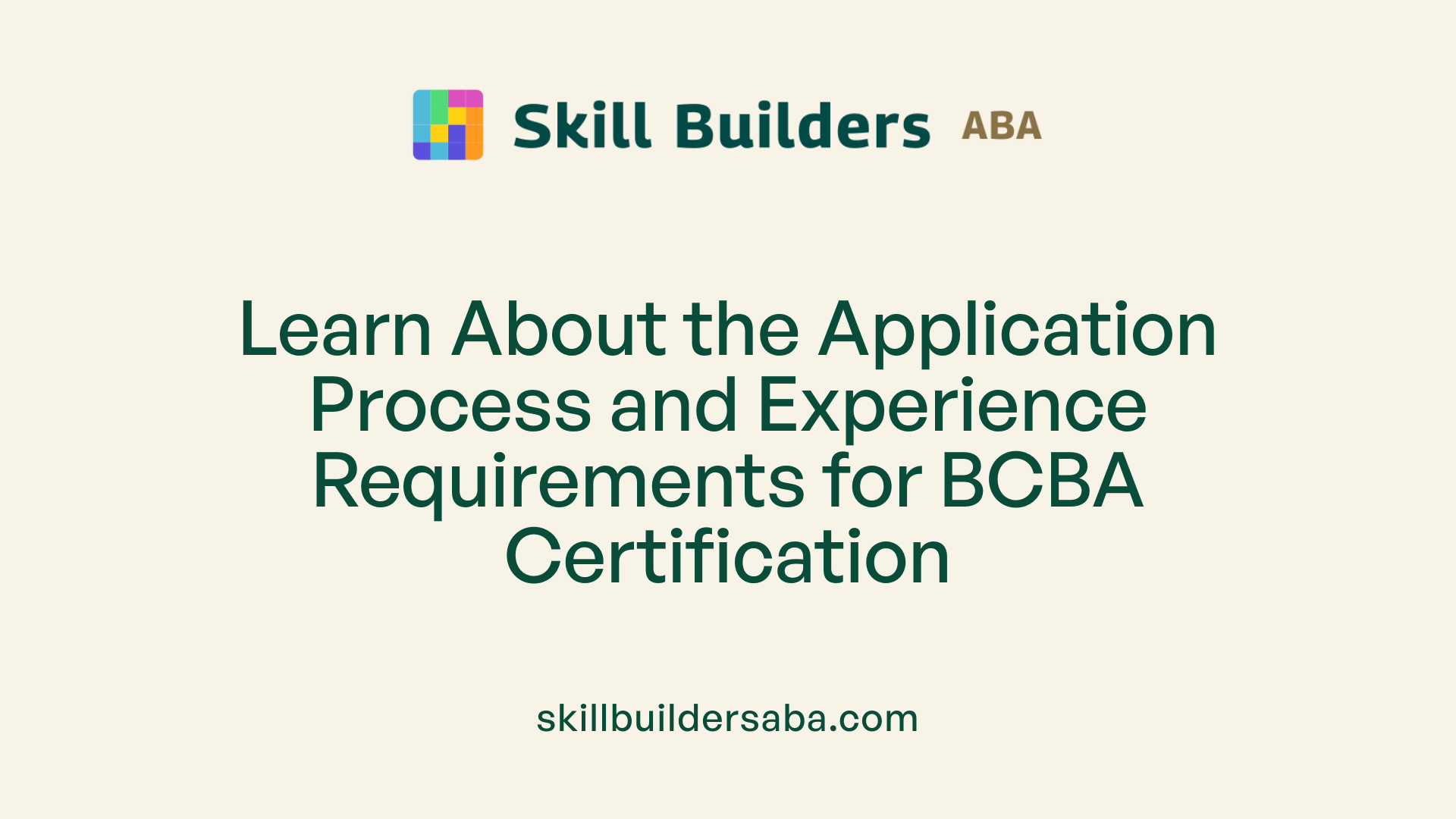
How To Become A Board Certified Behavior Analyst (BCBA)
Pathway to Becoming a Recognized Expert in Behavior Analysis
Your Guide to Achieving Certification as a BCBA
Becoming a Board Certified Behavior Analyst (BCBA) is a rigorous process that involves extensive education, supervised experience, and successful examination. This certification not only signifies mastery in applied behavior analysis (ABA) but also opens doors to impactful careers in clinical, educational, and research settings. Whether you’re starting your educational journey or seeking to understand the pathway to certification, this comprehensive guide details every step—from eligibility requirements to maintaining your credential—so you can confidently pursue this rewarding profession.
Understanding the Role and Responsibilities of a BCBA

What are the roles and responsibilities of a Board Certified Behavior Analyst (BCBA)?
A BCBA is a licensed professional trained to apply principles of behavior analysis to help individuals improve their social, communication, and learning skills. They design, oversee, and evaluate behavior intervention programs tailored to each client's needs.
BAs are responsible for conducting detailed assessments using observation and data collection techniques. Based on these assessments, they develop individualized treatment plans that specify which interventions should be used to promote positive behaviors and reduce harmful ones.
Supervision is a crucial part of a BCBA's role. They oversee Registered Behavior Technicians (RBTs), Behavior Analysts in Training (BCaBAs), and other staff, providing guidance and ensuring ethical, evidence-based practice.
In addition to direct service, BCBAs train caregivers, teachers, and other professionals. This training empowers those in daily contact with clients to implement proper strategies consistently.
Breas across various environments such as schools, hospitals, clinics, and community settings, BCBAs work with clients with autism, behavioral disorders, or developmental disabilities.
Maintaining their certification involves continuous education, adherence to ethical standards, and periodic recertification procedures. Their ongoing learning ensures they stay updated with scientific advances and best practices in applied behavior analysis.
By fulfilling these multiple roles, BCBAs ensure effective, ethical, and scientifically supported services that significantly impact clients' development and quality of life.
Educational and Coursework Pathways to Certification

What are the educational and coursework requirements for becoming a BCBA?
Becoming a Board Certified Behavior Analyst (BCBA) involves fulfilling specific educational prerequisites and coursework. Most candidates are required to hold a master's degree or higher in behavior analysis, education, psychology, or a related field from an accredited university.
A central component of the qualification process is completing at least 315 hours of behavior-analytic coursework. This coursework covers core content areas such as principles of behavior, measurement, assessment methods, intervention strategies, and professional ethics. The coursework must align with the standards set by the Behavior Analyst Certification Board (BACB) and may be part of a BACB-approved program or follow the Verified Course Sequence (VCS). The VCS is a structured set of courses verified to meet BACB requirements, ensuring students acquire the necessary knowledge base.
Some programs offer specialized coursework sequences that include topics like behavior assessment, behavior-change procedures, and philosophical underpinnings of behavior analysis. Certain courses are standalone, focusing on specific facets of ABA, and are evaluated by qualified faculty for BACB compliance.
In addition to coursework, candidates need to complete approximately 2,000 hours of supervised practical experience in applied behavior analysis. This experience is crucial for applying theoretical knowledge in real-world settings.
Several reputable institutions, including universities like UBC, UCSB, Florida Tech, and The Chicago School, offer programs that fulfill these coursework and experiential requirements. These programs are often delivered online, allowing students flexibility while ensuring they meet BACB standards.
Once coursework and supervised experience are completed, candidates sit for the BCBA exam. Certification maintenance involves ongoing continuing education units (CEUs), adherence to ethical standards, and recertification every two years.
This structured pathway ensures that aspiring BCBAs are well-prepared to deliver effective behavioral services and uphold professional standards in their practice.
Certification Examination: Structure, Preparation, and Success Strategies

What is the structure of the BCBA exam?
The BCBA certification exam consists of 185 multiple-choice questions designed to evaluate a candidate's knowledge of behavior analysis principles, research methods, assessment, and intervention strategies. The questions are based on the BACB’s Task List standards, particularly the 5th edition. Candidates are given four hours to complete the exam, which is administered in person at Pearson VUE testing centers.
The exam aims to assess practical skills and theoretical understanding, ensuring that BCBAs are well-equipped to independently provide behavior-analytic services. The diverse question types include scenario-based problems, direct application questions, and conceptual queries.
Following the exam, candidates receive preliminary results immediately at the testing site. Official results are typically mailed or emailed within about a week, indicating whether they have achieved competency and can proceed to certification.
How should prospective candidates prepare for the BCBA exam, and what are the assessment requirements?
Preparation begins with reviewing the BACB’s official resources such as the Task List, the BCBA Handbook, and the examination blueprints. Studying from recognized coursework, like the Cooper Book, which covers core concepts and practices, is highly recommended. These materials align with the exam content and provide a solid foundation for understanding core principles.
Candidates must also ensure they meet eligibility requirements before applying: this includes holding a graduate degree in behavior analysis or a related field, completing the required coursework (often a Verified Course Sequence or equivalent), and logging between 1,500 and 2,000 supervised fieldwork hours under qualified supervision.
Practice exams are an essential part of preparation. They help familiarize candidates with the question formats and timing constraints. Many candidates use flashcards, study groups, and online courses to reinforce their understanding.
On exam day, arriving early, managing time efficiently across the four hours, and carefully reading each question, are crucial. Candidates should aim to answer all questions accurately, aiming for a passing threshold set by BACB-certified experts. The exact passing score can vary but typically hovers around the standard 70-75% correct responses.
After passing, candidates gain immediate preliminary results and receive official certification results within about a week. Success in the exam confirms the candidate’s readiness to serve as a professional behavior analyst, completing the assessment requirement for BCBA certification.
Application, Experience Hours, and Eligibility Criteria

What is the certification process and application procedure for becoming a BCBA?
The journey to becoming a BCBA begins by ensuring you meet all the educational and experience requirements outlined by the Behavior Analyst Certification Board (BACB). Candidates must first earn a graduate degree in fields such as psychology, education, or applied behavior analysis. Next, they must complete approved coursework in behavior analysis, either through an ABAI-accredited program or a Verified Course Sequence (VCS).
Once coursework is completed, aspiring BCBAs need to gather supervised fieldwork hours—typically between 1,500 to 2,000 hours—in applied behavior analysis. These hours should be supervised by a qualified BCBA or BCBA-D and documented meticulously.
The application process involves reviewing the BCBA Handbook, which details all requirements, filling out an online application via the BACB portal, submitting necessary documentation, paying applicable fees, and awaiting approval. Once approved, candidates can schedule the BCBA exam, a four-hour computer-based test with 160 questions.
Passing the exam with a scaled score of 400 or higher confers the BCBA credential, which permits independent practice and supervision of others. Maintaining the certification requires ongoing professional development, ethics adherence, and recertification every two years with Continuing Education Units (CEUs)."
How many experience hours and fieldwork are required for BCBA certification?
Supervised experience hours form a crucial part of the BCBA certification pipeline. Candidates must complete either 2,000 hours of supervised fieldwork or 1,500 hours if engaging in concentrated supervised fieldwork under strict supervision standards.
These hours should be gained through activities like conducting assessments, designing interventions, analyzing behavior data, and training staff, all under the oversight of a qualified BCBA or BCBA-D. Administrative tasks are typically excluded from these hours.
Supervision must be consistent and well-documented, with supervisors providing monthly verification forms and overseeing activities aligned with BACB standards. The hours can be accumulated flexibly, including during breaks or semesters off, supporting learners with varying schedules.
Upcoming regulations starting January 1, 2027, will introduce additional requirements for documenting hours and may add pathways tailored to different educational backgrounds, ensuring flexibility while maintaining rigorous standards.
Post-Certification Maintenance and Career Development

How do I maintain and renew my BCBA certification?
To keep your BCBA certification active, ongoing professional development is essential. Every two years, you must earn 32 Continuing Education Units (CEUs). Among these, at least 4 CEUs should focus on ethics, and 3 CEUs on supervision activities if applicable to your role.
CEUs can be accrued through various activities such as attending approved conferences, completing graduate coursework, publishing scholarly articles, or participating in professional workshops. Proper documentation of these activities is necessary for renewal.
In addition to earning CEUs, you need to follow the BACB’s ethical standards and submit a renewal application through your BACB account before your current certification expires. Staying informed about updates from the BACB and completing these requirements ensures your credential remains valid and demonstrates your ongoing dedication to professional growth.
What are the career opportunities following BCBA certification?
BCBA certification opens numerous pathways for career advancement. Many BCBAs work independently or as part of multidisciplinary teams in clinics, schools, hospitals, or private practices.
Career options include providing behavioral interventions for individuals with autism and developmental disabilities, conducting assessments, developing treatment plans, and supervising other professionals like Registered Behavior Technicians (RBTs) and BCaBAs.
Specialization areas are expanding, including fields like organizational behavior management, education, and social services. As demand for behavior analysts grows—marked by significant job posting increases from 2017 to 2023—career prospects are bright.
With experience, BCBAs can advance into supervisory, training, or research roles. The profession also offers opportunities to work across diverse settings such as healthcare, educational institutions, and private practice, often with increasing salary potential.
Overall, earning a BCBA certification provides a strong foundation for a rewarding career in improving lives through behavior analysis and offers room for professional development and specialization.
Embarking on a Professional Journey in Behavior Analysis
Becoming a BCBA is a demanding yet rewarding process that requires dedication, comprehensive education, and practical experience. The pathway outlined—from obtaining a relevant master’s degree and completing supervised fieldwork to passing a rigorous exam—serves as a roadmap for aspiring behavior analysts. Once certified, BCBAs have avenues for lifelong professional growth through ongoing education and specialization, contributing significantly to improving lives through evidence-based behavioral interventions. With the demand for qualified behavior analysts expanding and the profession offering diverse career opportunities, now is an ideal time to pursue this impactful and respected credential.
References
- Board Certified Behavior Analyst
- How to Become a Board Certified Behavior Analyst (BCBA): Five Steps
- BACB - Behavior Analyst Certification Board
- What is a BCBA? Your Guide to the BCBA Certification & Exam
- Behaviour Analyst Certification
- Board Certified Behavioral Analyst Career Overview - Psychology.org
- BCBA® Certification & Requirements: A Step-by-Step Guide
- How to Become a Board-Certified Behavior Analyst (BCBA)
- How To Become a Board Certified Behavior Analyst
- How to Become a Board Certified Behavior Analyst (BCBA) in 2022
Reach Out Today
Learn more about how we can support your child’s growth and development. Contact us to discuss our services and availability in your area.
.svg)